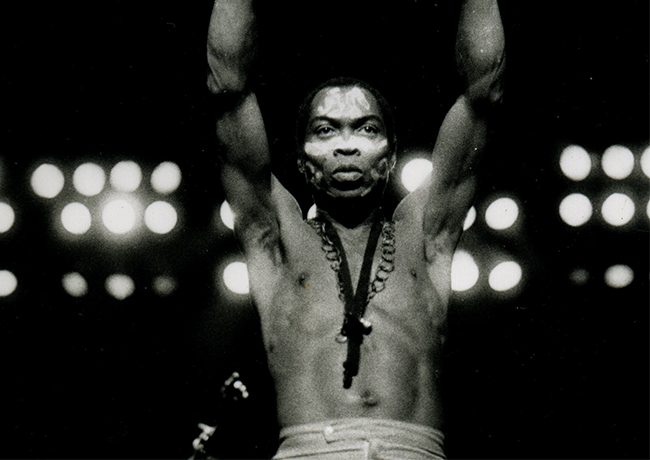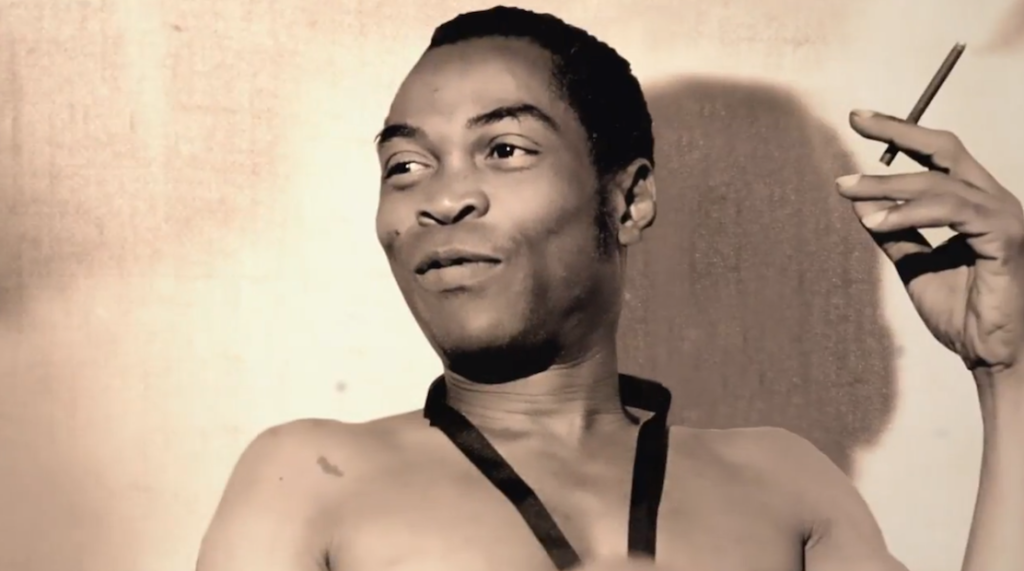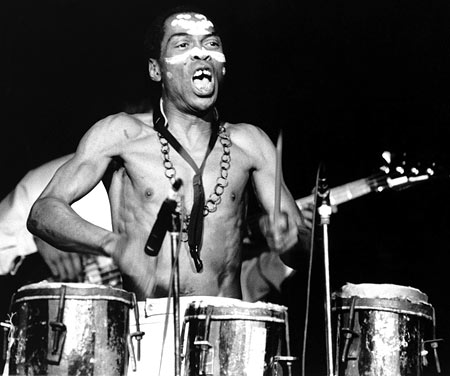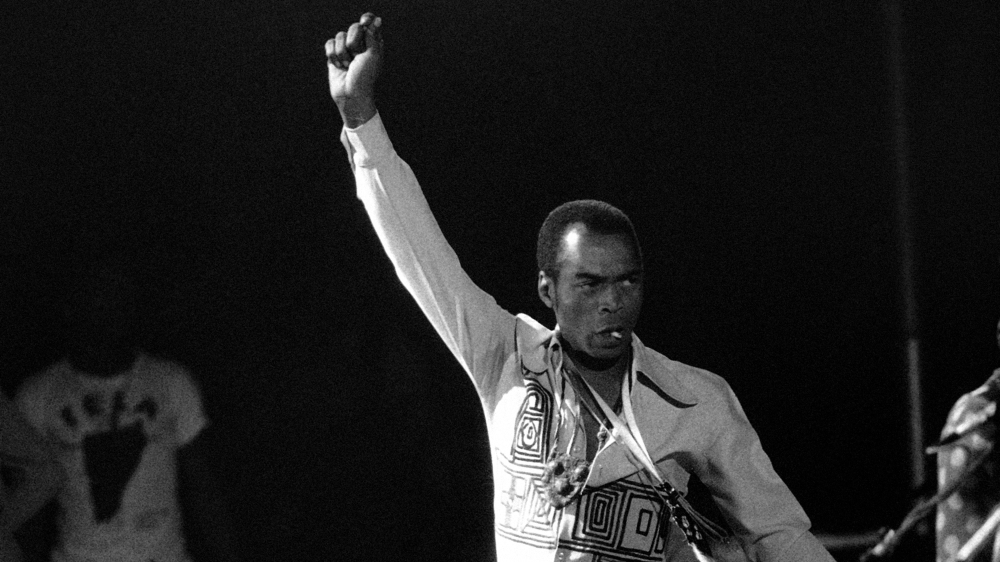By Abass Oyeyemi
Born Olufela Olusegun Oludotun Ransome-Kuti to a conservative Abeokuta middle-class family of a Reverend father and disciplanarian mother in 1938. Fela went against all odds, defied all norms and ignored all privileges offered to him by life, to create a life of his own; a non-conformist one.

Upon becoming emancipated from the shackles of neo-colonialism, he replaced his English name “Ransome” to “Anikulapo” i.e the one who had death in his pouch. Looking at the impact of his works and evergreen nature of his Afrobeat today, one cannot agree less that he reigns eternal in the mind of music lovers.
That said, many things have been said about Fela and his anti establishment stance. Even though this establishment that oppressed and persecuted him while he was alive, have grown to like him. The pan africanist and political views of Fela Anikulapo Kuti has been told several times. However, the evolution of his music has been given little time to discuss. No wonder, every riff raff would identify with Fela’s music and claim to be new Fela, yet be against the ideals Fela stood for. Like the head of Fela’s Egypt ’80 Band, Seun Kuti would say “ I believe that true love must come with knowledge. To love something, you have to know it. That is why people don’t marry strangers.” Hence, open your eyes as we move to this musical contraption of Abami Eda.
“Fela drops highlife” was the headline Sunday Times published on August 18, 1968 as written by Victor Dorgu. More interestingly it is to note that Fela performed in the band of Dr. Victor Olaiya before traveling oversea to further his education. It was this highlife background that led to the formation of Fela’s first band in London named Koola Lobitos in 1961, the band was formed alongside his Nigerian friends, Wole Bucknor and J.K. Braimah- who his friendship dated as far back as secondary school. They played Highlife, Calypso, Jazz and some other songs. The band became one of the top bands in the London musical scene at that time. He recorded Bonfo and Fere with his Koola Lobitos band in London while still playing Highlife. Fela was extremely successful with Koola Lobitos in London.

As he would later admit, “my four and a half years in Britain allowed me to really get in touch with jazz. At school I studied classical music. But outside of Trinity I played jazz”. So, upon returning to Nigeria to pick up a work as a Producer at the Nigerian Broadcasting Corporation, he formed his band named Fela Ransome-Kuti Quintet. Upon the formation of the band, Fela and his team played strictly Jazz as supported by Spearman, “Let’s Dig Jazz,” Reviews, Drama, Spear Magazine, February 1964 where it was written innocently, “For the leader of the quintet, Fela Ransome-Kuti, his job is his hobby. A trained musician and music producer at the Nigerian Broadcasting Corporation, he has pledged himself to make jazz part of the Lagos scene. And man, he may well succeed”.
Unfortunately, Jazz refused to become popular in the Lagos scene and Fela did not succeed at it. Fela mentioned it in an interview with Shawn Kelly, “straight jazz as it’s played in the states is not working here. I found that out when I came back from England. We started to play jazz, people wouldn’t listen.” As his supportive mother would later tell him to sing what his people really understand. Hence, Fela decided to experiment the fusion of Highlife and Jazz, which he called ‘highlife-jazz’.

However, to the Lagos audience, Highlife-Jazz was confusing and disjointed to the ears. While Fela was trying to get his shit together, Sierra Leonean James Brown, Geraldo Pino came for a tour in Africa in 1966/1967 and he took Nigeria by storm, pocketing the Nigerian music audience with his soul music.
It had devastating effects on Fela that he fled to Ghana, upon getting to Ghana, he met Geraldo Pino controlling the whole scene there, that Fela said he forgot that he, himself was a musician. This made Fela return to Nigeria but returned to Ghana almost immediately. It was in Ghana that resorted to brand his music with the name, Afrobeat. He called a press conference about the change in his music to afrobeat which led to the publication on Sunday Times that Fela drops highlife in 1968.
Prior to this time, Fela had experimented with songs like “Omuti tide,” “Wa Dele Wa Rohin,” “Obinrin Le,” “Omo Ejo,”, “Ajo,” “Yabomisa,” “Onidodo,” “Alagbara,” “Lagos Baby,” and “Abiara”. Of top songs Fela experimented with is Ololufe which was a love song and a contradiction of Fela latter years. It was not just like the few other love songs he wrote but instead had marital commitment in it. It was recorded in Yoruba and English.
In 1969, Fela embarked on a ten months tour to the United States, it was during this tour he met his girlfriend, Sandra Isidore who was a member of the Black Panthers. The African American lady introduced Fela to the writings of Malcolm X. From where began a transition of Fela to a pan africanist and ultimately a new direction for Afrobeat which until then had no direction. Prior to meeting Sandra Isidore, he was just a young who’s focused on the hustle bustle of life and wasn’t concerned with the political happenings around him and didn’t even know the history of the blacks.
Autobiography of Malcolm X was the book that changed his life as he wanted to be like Malcolm X. It was in United States, Los Angeles to be specific that Fela decided to change his band name from Koola Lobitos to Nigeria ’70. He would later describe the name Koola Lobitos as stupid and meaningless. Fela and his Nigeria ’70 band recorded his first afrobeat song, My Lady Frustration. He recounted that the song changed his approach to songwriting as he attempted to sing like Africans by chanting in the beginning of the song like a typical African, he did this in the room of Sandra Isidore.

December 1970 saw Fela changed the name of his band to Africa ’70 to reflect what his new sound stands for — Pan-Africanism. He ushered in the new decade with a masterpiece titled Jeun Koku. Jeun Koku gave him wider recognition. In fact Fela Kuti once announced that Jeun Koku was his first African music. Jeun Koku featured unprecedented melodic lines, folklores and humor in Fela’s music. Throughout the 1970s, Fela built upon the success of Jeun Koku with several hits upon hits. Every song was a hit back to back, from Jeun Koku to Lady to Gentleman to Shakara Oloje to Swegbe and Pako to Jenwi Temi to Water No Get Enemy. More importantly to note was that the 1970s brought the opportunity for Fela to completely drop the usage of English Language in his songs as he settled for pidgin English and Yoruba. It was indeed a 70 to remember for the Africa ’70. From the music to the album art cover designed by Lemi Gharioku, you’ll know that Fela oozes art and creativity and could have easily succeed in any other chosen genre.
It was a new decade and most of the band members of Africa ’70 were getting tired of Fela’s new political advents. A tour to Berlin in 1979 presented many of them an opportunity to jump the ship in all sense of it. Of most significant of those that dumped the band was Tony Allen who was the drummer for the band and who Fela would say, “without Tony Allen, there would be no afrobeat”. While leaving the band, Tony Allen said he signed up to play music and not militancy. Tony Allen would later form his own band in Europe, he was the one that exported Afrobeat overseas. The exit of the Africa ‘70 band members led to the formation of a new band named Egypt ’80 to reflect Fela’s new found love in mysticism. The band was far bigger than Fela’s previous bands and the music they produced became longer. Teacher Don’t Teach Me Nonsense, Movement Of The People, Army Arrangement, Original Sufferhead, Coffin for Head of State and Beast Of No Nation were the hits from Egypt ’80 in the 80s. The 80s was significant to the Kutis as his first son, Femi Kuti quit the Egypt ’80 to form his Postive Force Band. Fela was also signed to the Arista music.
1990s came and it was less of activity for the musical Fela and political Fela. He didn’t release any album during this period. However, he released songs like “Just Like That”, “Overtake don Overtake Overtake,” “Big Blind Country”, “Nigerian Natural Gas”, “Government of Crooks”, “Bamaiyi” and “Confusion Break Bone”. His last record was Condom Scallywag and Scatter.
Chief Priest of Afrobeat died in 1997 but instead of the music to go with him. It has continued to wax stronger. It’s now a cultural identity. Afrobeat has gotten to all corners of the world from Iceland to San Marino and to everywhere.
Fela’s undying influence in African music has gone to outlive him. Afrobeat has gone on to become the most recognized music genre, if not the only in Africa. One will wonder how some African artists are considered afrobeat artists because of the lack of social consciousness in their music, but because of the absence of a genre to categorise them, their social wokeness is mistaken for social consciousness, and thus are labeled afrobeat artists.
Abass Oyeyemi is a 500 Level Student of Obafemi Awolowo University and can be reached via 08027821451


Comments are closed.